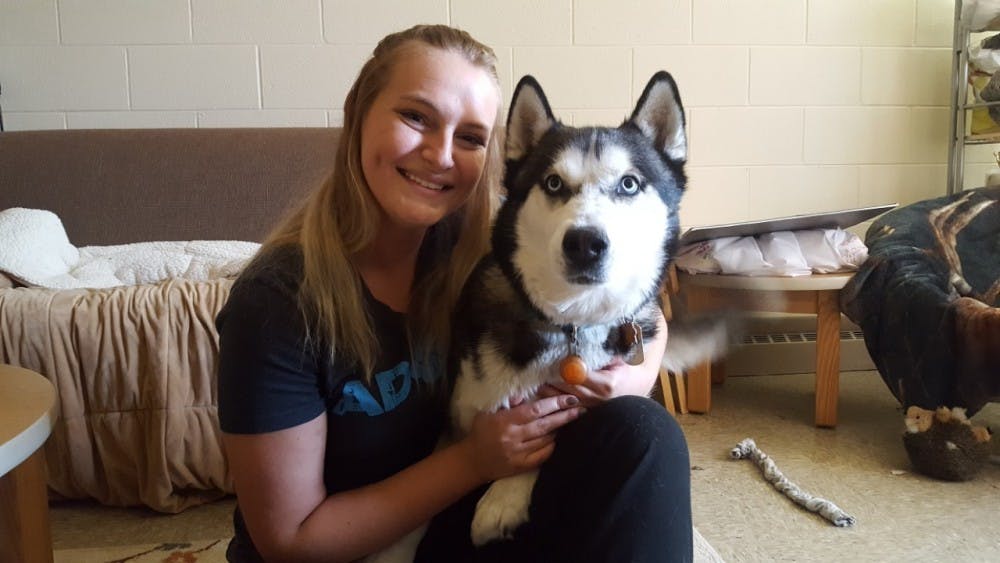Emotional support animals provide motivation, calmness for students

CMU student, Courtney Ignat poses next to her support Husky, Magnum. Their favorite thing to do is play at the dog park.
For many years, emotional support animals have helped their owners whether it be through emotional support or alerting to upcoming seizures.
At Central Michigan University, students with emotional support animals can register their pets and have them in the residential halls. Students have to provide the required paperwork tot he Student Disability Services office.
Service animals, which are animals who have been trained to work and provide assistance to their owner, don't need to be registered through the SDS office. The owner just has to alert SDS that they have a service animal.
Emotional support animals, however, do need to register their animal with SDS because they are still seen as pets.
Owners of a support animal need to provide a written conformation of a disability by a doctor or therapist, documents stating the effectiveness of the animal, documents verifying that the animal is healthy and the animal doesn't pose a threat to others.
Except for reptiles, all animals can be accepted.
The pets are only allowed in the student's room and just outside the students's rooms. They aren't allowed to walk through campus. When the owner is not home, the pet has to be crated to avoid problems with roommates, said Lynn L'Hommedieu, director of SDS.
As long as the student provides the correct documentation, the process of registering the animal can be completed quickly, she said. The process could take longer if proper documentation is not provided. Almost half of the students who try to register their animal with SDS don't continue with the entire process, she said.
Currently, there are about 15 emotional support animals and six service animals on campus, according to SDS.
Senior Keegan Bosch has had his service dog, Willow, for two and a half years. He's had her on campus since the Fall 2018 semester.
Bosch can become overwhelmed in certain environments due to his autism. These moments can cause him to have a panic attack or even a petite seizure. Willow can sense when Bosch is going to have an attack or seizure and usher him out of a room to perform deep pressure therapy.
"She started alerting to my seizures soon after I got her as a puppy and then we went through the training process," Bosch said.
Although Willow only alerts once or twice per week, Bosch says that just having her around calms him down.
"Just knowing that she is there and will help me when I need it is so helpful," he said. "Instead of worrying and stressing about what is going to happen, I can focus on my school work and other important things."
Rachael Masch, a graduate student from Laveen, Arizona, has an emotional support cat, Figaro, for about a year. Figaro helps with Masch's anxiety and depression. He keeps Masch motivated.
"He keeps me going," she said. "I could have a bad day at school and see him and he just makes it better."
Houghton Lake junior Courtney Ignat has a 3-year-old husky named Magnum, who helps with Ignat's anxiety and depression.
"He just keeps me going," she said. "How can you not smile after coming home from school and seeing that face? The times when he go out for walks or go out to the park is the happiest time of my day."
Unlike Masch or Bosch, Ignat said the registration process with SDS was long and frustrating. The office requested more letters from her therapist because they were "not up to their standards," Ignat said.
Ignat contacted SDS months before the school year started. But, the process didn't come to an end until more than a month into the first semester.
"It was frustrating, but I'm just glad I get to have him with me," she said. "He makes my days so much better and although it's a lot to have to take him out multiple times a day while studying, he is worth it and keeps me sane."
To learn what you have to do to register your support animal with SDS, visit the SDS webpage.





